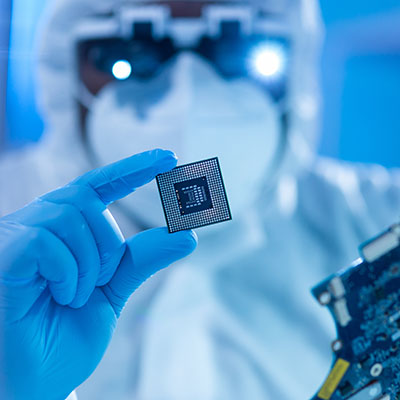Officials from the University of Florida and other key partners in the National Science Foundation Engine: Central Florida Semiconductor Innovation Engine are coming together near Kissimmee, Fla., on Tuesday for a site tour of the NSF engine. The regional coalition aims to boost the state’s semiconductor talent, infrastructure and research to strengthen national security and spur economic growth.
The Central Florida Semiconductor Innovation Engine, announced in January, is one of 10 NSF regional innovation engines and is led by BRIDG, a Florida-based nonprofit public-private partnership focused on developing and commercializing advanced technologies. It is the only semiconductor-focused engine and will initially receive up to $15 million in funding over the next two years.
“This program is focused on building a collaborative ecosystem of researchers, manufacturers, suppliers, workforce and economic development professionals to grow the Florida-based semiconductor industry,” said Dr. David Arnold, director of the Florida Semiconductor Institute.
Based in Neo City, a 500-acre technology campus in Osceola County, the NSF Engine: Central Florida Semiconductor Innovation Engine is aligned with statewide efforts to expand semiconductor manufacturing in Florida. These programs are driven by the CHIPS and SCIENCE Act, which allocated approximately $53 billion to bolster domestic semiconductor research and production.
The Central Florida Engine will begin by supporting five application-oriented research projects at partner institutions including UF, the University of Central Florida and imec that will provide immediate benefits in areas such as advanced semiconductor packaging, security and diverse microelectronic systems designed to operate in extreme environments.
Collaborating on the Central Florida Engine is a group of 10 University of Florida researchers led by Yong Kyu Yoon, PhD, professor in the Department of Electrical and Computer Engineering at the Herbert Wertheim College of Technology.
“We are pleased to serve as part of the NSF Regional Engine Program team. We are the only team in Florida and the only semiconductor-focused team directly responding to CHIPS and science law national activities,” Yoon said. “The Florida team is proud to be leading the way in the areas of critical semiconductor packaging, manufacturing and security. We are committed to advancing the U.S. semiconductor industry and contributing to the nation’s economic growth and security.”
The UF team includes faculty members in the Department of Electrical and Computer Engineering: Dr. Navid Asadi, Dr. Christophe Bobda, Dr. Farimah Farahmandi, Dr. Baibhab Chatterjee, Dr. Philip Feng and Dr. Mark Tehranipoor, as well as Dr. Gloria Kim from the Department of Engineering Education, Dr. Brent Gila from the Department of Materials Science and Engineering and Dr. Hyo Kang from the UF Digital Worlds Institute.
In addition to research initiatives, Central Florida Engine’s economic and workforce partners are helping to build a vibrant ecosystem that will enable Central Florida workers to access high-paying jobs in the local semiconductor industry.
Most semiconductor manufacturing takes place in a few countries overseas, even though the United States invented much of the technology. Decades ago, production was offshored to Asia, leading to current supply chain and security issues. The CHIPS & Science Act, signed into law in 2022, aims to bring semiconductor manufacturing back to the United States through significant infrastructure spending, research funding, incentives, and investment.
After an initial award of $15 million, the Central Florida Engine could receive $160 million over the next 10 years, depending on congressional funding.
NSF’s initial investment of $150 million in the first regional engine has been nearly doubled through commitments from state and local governments, other federal agencies, philanthropic organizations, and private companies.
With a potential investment of nearly $1.6 billion from NSF over the next decade, the NSF Engine represents one of the largest single investments in community-based research and economic development in U.S. history and a unique commitment to position science and technology leadership as a central driver of regional economic competitiveness and job creation.
“The inaugural NSF Engine awards demonstrate our enduring commitment to creating opportunity everywhere and enabling innovation everywhere,” said NSF Director Sethuraman Panchanathan. “Through these NSF Engines, NSF aims to expand the frontiers of technology and innovation and drive economic growth across the nation through unprecedented investments in people and partnerships. NSF Engines have tremendous potential to elevate and transform entire geographic regions into leading global centers of innovation.”
The Central Florida Engine partnership includes BRIDG, UF, UCF and imec, as well as CareerSource Central Florida, Florida High Tech Corridor, Orlando Economic Partnership, Osceola County and Valencia College.
September 24, 2024

